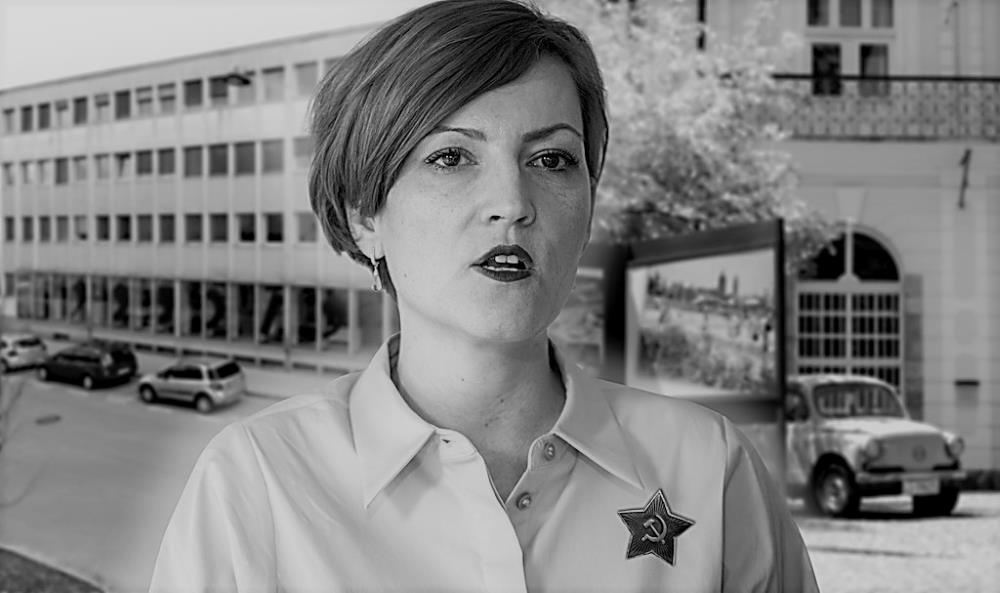By: Dr Jože Dežman
Dear Minister, The historical year since your magical flight among the spirits of Čebine is coming to an end.
You abolished the Museum of Slovenian Independence, the Day of Remembrance for the Victims of Communism, banned the exhibition on the research in the Cave under Macesnova Gorica, and have inscribed yourself in history as the most incompetent and uncultured Minister of Culture in the history of the Republic of Slovenia.
From Čebine to shards, so it repeats and repeats…
Čebine is the source of your enthusiasm, and I kindly ask for your comment on your shard-like works, which can be summarised from public records.
In devout anticipation of your perspectives, I note with excellent respect.
Dr Jože Dežman
In the year ahead – the first anniversary of Dr Asta Vrečko’s Čebine speech
A year ago, Minister of Culture, Dr Asta Vrečko, gave a speech on the anniversary of the establishment of the Communist Party of Slovenia. She demonstrated modest historical knowledge, especially regarding the Communist Party, despite being an art historian who, according to the topic of her doctoral dissertation, should have been knowledgeable about the pre-war history of Yugoslavia. However, she stumbled even on basic historical facts, such as the introduction of King Alexander’s dictatorship and the assassination of the Yugoslav king. These are important events that marked the political, social, and judicial events in the country.
A year ago, the minister’s supporters tried to cover up her ignorance with media silence or by referring to improvisation in her speech. Observant observers were surprised because the expertise of the minister was emphasised so much, her academic status, unlike any other minister in Golob’s government. Unusually so – what is generally known does not need to be emphasised specifically, and vice versa. Perhaps they wanted to communicate to the public – and not just in the bubble – that the minister would either carry out a cultural revolution based on diamat or continue her research and thus remain employed at the Faculty of Arts, University of Ljubljana.
According to official data in the SICRIS system, Ms. Vrečko is still employed for 50% of her working time at the Faculty of Arts, University of Ljubljana, specifically in the programme group and project (https://apps.izum.si/ecris/si/sl/researcher/35957). This is not in line with the Employment Relationships Act, as researchers can have additional employment for only 20% above full-time employment (40 hours/week). Well, unless Ms. Vrečko is employed as a minister for only 70% of her working time. A more likely explanation is that Ms. Vrečko simply did not fulfil her duty and report the data to the public agency that funds her salary at the university. However, Ms. Vrečko is certainly additionally employed, as she is listed among the members of the research program and project for the year 2024 as well (https://apps.izum.si/ecris/si/sl/project/17677; https://apps.izum.si/ecris/si/sl/project/18805).
So, Ms. Vrečko has adorned herself with a third engagement – in the academic sphere, alongside her two commitments (at the Ministry of Culture and in the Levica party), which demand a high level of work ethic, effort, and concentration from a talented and highly qualified individual. What does her government colleague, former party coordinator and former interim prime minister Luka Mesec, have to say about such workload?
And what are the academic achievements of such a politician, who is also, according to official data, an extremely burdened researcher in her spare time, Asta Vrečko? Will she be able to renew her habilitation, given that she has so little time for research? Or perhaps she conducts research when engaged after work at the ministry and in the party? The answer lies in her biography. A modest biography, especially for a young person who must prove themselves through publications. Ms. Vrečko has 30.25 points in the SICRIS system – this ranks her 96th among art historians – she is separated from the top-ranked researcher by 1520 points (https://apps.izum.si/ecris/si/sl/top/researcher). Ahead of her are numerous doctoral students, retirees, and inactive researchers in the academic world. Ahead of her are people whose work is public – they can articulate and publish their positions and arguments – and they do not receive payment for it.
Ms. Vrečko’s ranking is the result of a modest bibliography. In the last five years, Ms. Vrečko has published only two chapters in a monograph in the category of classified scientific publications. Both publications are officially classified as catalogues (https://plus.cobiss.net/cobiss/si/sl/bib/73960451#full; https://plus.cobiss.net/cobiss/si/sl/bib/299324928#full), so the question arises whether the chapters even meet the criteria for the status of a scientific text. If the mentioned chapters do not meet the criteria for a scientific publication, which is likely, then Ms. Vrečko has not had a single scientific publication in the last five-year period according to the rules of the national research agency, the funder of her salary.
Is it possible to maintain habilitation with such modest academic achievements, which are used to verify the qualifications of candidates for scientific work and ensure high scientific standards? According to information, the University of Ljubljana appointed Ms. Vrečko as an assistant professor in April 2018 for a period of five years. Considering the maternity leave during her tenure, her habilitation was most likely extended for the duration of maternity leave. This means that her habilitation for the title of assistant professor will expire shortly. Given the absence of documented scientific and pedagogical achievements, the question arises whether the scenario similar to that in Maribor will occur (where a researcher was dismissed after the expiration of habilitation due to incompetence), or whether the Latin saying quod licet Iovi, non licet bovi (what is allowed to Jupiter is not allowed to the ox) will prevail.

